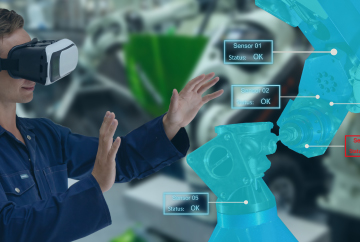The potential of Generative AI in manufacturing
With its ability to process huge amounts of data and generate intelligent insights, Generative AI has the potential to promote innovation, efficiency and sustainability, making it a transformative force in the manufacturing industry. Generative AI promises to accelerate agility in a dynamic, ever-changing landscape, with the ability to deal with changing specifications, adapt to uncertain conditions and drive adaptive optimization.
Integration of Generative AI into operations enables manufacturers with accelerated detection of inefficiencies and optimization of production processes, which in turn decrease downtime and boost productivity. The negative financial effects of recalls and rework can be reduced, minimizing faults and enhancing product quality. By analyzing equipment data to forecast failures and optimally schedule maintenance before problems develop, it can improve predictive maintenance and enable manufacturers to make data-driven decisions for improved resource allocation, waste reduction, and increased productivity. Generative AI also shows great potential in adapting insights and suggestions for multiple personas at different levels with disparate competencies and skill sets.
These Generative AI manufacturing applications demonstrate how it can increase productivity, reduce costs, and enhance agility in the current competitive environment.
Key Use Cases Across the Manufacturing Value Chain
In an era where innovation and efficiency are paramount, Generative AI has emerged as a powerful ally for manufacturers, offering a spectrum of advanced capabilities that enhance every facet of the manufacturing process. Here are some critical use cases for Generative AI across the manufacturing value chain:
Product Design and Development
Generative Design: Generative AI utilizes algorithms to generate and optimize product designs based on multiple, specific parameters such as materials, weight and performance criteria. By exploring countless design alternatives, Generative AI can help manufacturers accelerate the identification of innovative product designs and ensure that these align with evolving customer expectations.
Prototyping and Simulation: Generative AI simulates virtual prototypes that mimic real-world conditions, allowing manufacturers to test and refine product designs digitally, significantly reducing the need for costly physical prototypes. This can expedite new product development timelines and allow for customization for specific target segments. Generative AI can also help in generating optimal mixes of existing and new design variants, allowing for faster turnaround and reuse of existing resources leading to optimized production.
Supply Chain Management
Demand Forecasting: Generative AI leverages historical data and analyzes market trends to enhance demand forecasting accuracy, enabling manufacturers to optimize alternatives, production and inventory planning by considering factors such as seasonality, economic indicators and consumer behavior patterns across different segments.
Inventory Optimization: Generative AI analyzes multiple variables, including historical sales data, lead times and demand patterns, to determine optimal inventory levels at different supply chain stages. This also allows manufacturers to rapidly deal with market fluctuations and avoid understocking and overstocking costs.
Supplier Selection: Generative AI evaluates potential suppliers based on quality, cost, delivery times and past performance, allowing manufacturers to streamline supplier evaluation and decision-making, leading to efficient and reliable supply chains. It can also help analyze the existing mesh of suppliers and rapidly take into account several non-linear dependencies and factors.
Production and Manufacturing
Quality Control: Generative AI helps identify quality issues early in production, enabling manufacturers to reduce defects, minimize waste and maintain consistently high-quality products.
Predictive Maintenance: Generative AI predicts equipment failures by analyzing historical data, sensor inputs and other factors. It enables manufacturers to proactively schedule maintenance activities by detecting early signs of equipment deterioration, reducing unplanned downtime and preventing costly breakdowns.
Process Optimization: Generative AI allows manufacturers deal with complexity and multiple interconnected processes by identifying the right way forward. It can help generate action plans and best fixes in association with the production plan. It also allows for rapid adjustments of production schedules to optimize lead times and costs.
Generative AI analyzes vast production data to identify inefficiencies. It helps manufacturers increase productivity, reduce energy consumption and improve overall process efficiency by identifying bottlenecks, streamlining workflows and adjusting parameters.
Logistics and Distribution
Route Optimization: Generative AI optimizes delivery routes based on multiple factors including distance, traffic conditions, delivery deadlines, shipping costs etc. It generates the most efficient ways by considering multiple variables, resulting in cost savings, shorter delivery times and improved customer satisfaction.
Warehouse Management: Generative AI assists warehouse operations by automating tasks such as picking and packing. Generative AI helps robots and machine learning algorithms to optimize these processes, leading to faster order fulfillment and improved inventory accuracy.
Last-Mile Delivery: Generative AI optimizes delivery schedules, routes and methods by considering customer preferences, traffic conditions and delivery time windows, resulting in faster and more cost-effective last-mile delivery.
Quality Assurance
Defect Detection: By analyzing visual data and comparing it against quality standards, Generative AI algorithms identify even subtle defects, allowing manufacturers to take immediate corrective actions and reduce defects in the production process.
Statistical Process Control: Generative AI continuously monitors manufacturing processes, comparing real-time data to statistical models. It triggers alerts by identifying variations or abnormalities in-process data, ensuring the manufacturing process remains within specified control limits.
Sustainability and Environmental Impact
Carbon Footprint Reduction: Generative AI suggests strategies for minimizing a company's carbon footprint and achieving sustainability goals by analyzing production data, supply chain information and energy usage patterns.
Waste Reduction: By analyzing numerous factors such as material usage, production efficiency and distribution practices, Generative AI algorithms suggest improvements that result in reduced waste and improved resource utilization.
Energy Management and Consumption Optimization: Generative AI optimizes energy usage in manufacturing facilities by analyzing data from various sources, such as energy meters, sensors and production data and automatically adjust operations. By identifying energy-intensive processes and equipment, Generative AI suggests energy-saving measures, reducing costs and minimizing the environmental impact of manufacturing operations.
Customer Engagement and Support
Chatbots and Virtual Assistants: Generative AI-powered chatbots enable manufacturers to automate customer engagement and support activities. These conversational AI agents can handle customer inquiries, provide order tracking information, offer technical support and assist with various customer service functions.
Personalization: Generative AI analyzes customer data, including purchase history, browsing behavior and preferences, to offer personalized product recommendations and services. Manufacturers can deliver targeted marketing messages, tailor product offerings and enhance customer satisfaction by understanding individual customer needs and interests.
Regulatory Compliance
Compliance Monitoring: Generative AI assists manufacturers in monitoring and ensuring compliance with industry-specific regulations and standards. AI algorithms flag potential compliance issues by analyzing relevant data and comparing it to regulatory requirements, allowing manufacturers to take corrective actions and avoid penalties.
Employee Training and Safety
Simulation and Training: Generative AI provides realistic training simulations for employees, especially those that work in hazardous environments. By creating virtual scenarios that mimic real-world conditions, Generative AI helps employees acquire new skills, practice complex tasks and improve workplace safety.
Worker Safety: Generative AI-powered systems monitor workplace safety by analyzing sensor data and video feeds to trigger alerts and notifications by identifying potential risks or unsafe conditions, enabling timely intervention and accident prevention.




